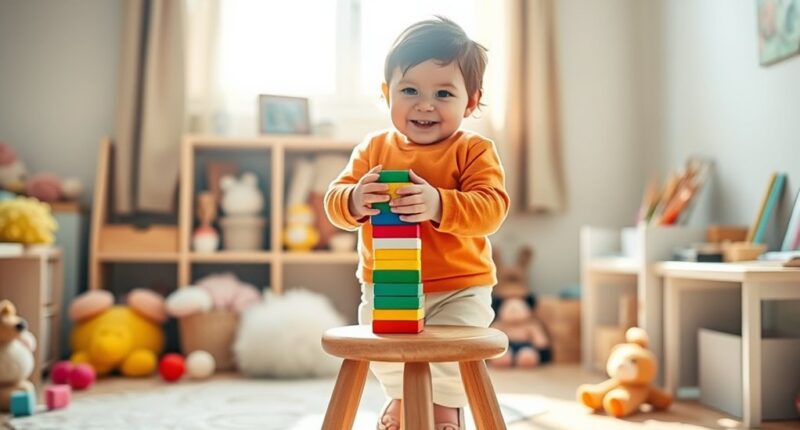Encouraging independence in toddlers is essential for building their self-confidence. It fosters problem-solving and decision-making skills while promoting emotional regulation. To help them grow, create environments that support autonomy and establish consistent routines. Encourage self-care and allow for choices in daily activities. Celebrate their successes to boost their confidence and motivate them to tackle new challenges. Discover more effective strategies and insights to further enhance your child’s independence and confidence along the way.
Key Takeaways
- Create a supportive environment with child-sized furniture and labeled storage to encourage exploration and independence.
- Establish consistent routines to help toddlers anticipate tasks and build a sense of security.
- Celebrate small achievements to reinforce confidence and motivate further independent actions.
- Offer choices in daily activities to empower decision-making and reduce power struggles.
- Facilitate social interactions through group activities to enhance communication skills and confidence in independence.

Delta Children 4-Piece Toddler Playroom Set, Grey/White
WHAT’S INCLUDED: 4-Piece Playroom Solution Set by Delta Children includes a Table and 2 Chairs and 6-Bin Toy…
As an affiliate, we earn on qualifying purchases.
As an affiliate, we earn on qualifying purchases.
Understanding the Importance of Independence in Early Development

Understanding the importance of independence in early development is essential for fostering a child’s growth. When you encourage independence, you’re helping your child build self-confidence and self-esteem. This positive foundation allows them to tackle challenges with a can-do attitude.
Independence enhances their problem-solving and decision-making skills, which are critical for cognitive development. As they learn to navigate various situations, they also gain resilience and adaptability. Engaging with toys that promote educational and skill-building can further support their learning journey. Moreover, effective emotional regulation is developed as children learn to manage their feelings and actions through independent experiences. Additionally, engaging with STEM toys can introduce them to foundational skills in science and technology, further enhancing their cognitive abilities. Research indicates that early exposure to STEM education builds foundational skills for future learning.
Additionally, fostering independence supports the growth of significant social skills, including cooperation and communication. This early autonomy lays the groundwork for lifelong learning and self-sufficiency, equipping your child with the tools they need for future success. Regular outings for puppy socialization can also mirror the social experiences that promote adaptability and confidence in children.
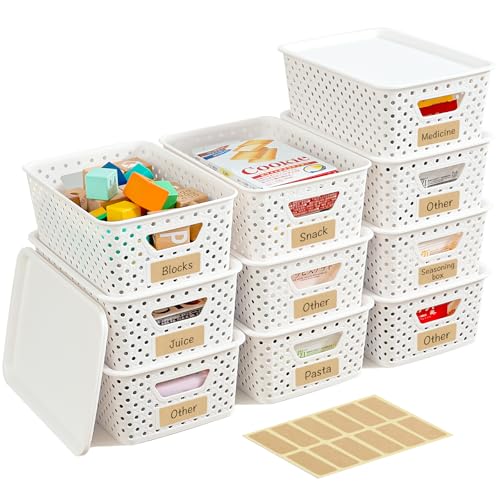
10 Pack Plastic Storage Bins with Lids, Stackable Plastic Storage Baskets for Organizing with Handles, Organizer Bins with Labels for Room, Craft, Containers for Pantry Organizers and Storage
【Value 10-Pack Plastic Storage Baskets Set】: Includes 10 pack small plastic storage bins with lift-off lids, featuring a…
As an affiliate, we earn on qualifying purchases.
As an affiliate, we earn on qualifying purchases.
Strategies to Foster Independence in Daily Life

Fostering independence in toddlers can be a rewarding journey for both you and your child. Start by creating supportive environments with child-sized furniture and labeled storage, making it easy for them to play and tidy up. Establishing a routine that emphasizes critical periods for skill acquisition can further enhance their readiness for independence. Additionally, providing opportunities for high contrast visuals can stimulate their cognitive development.
Creating supportive spaces with child-sized furniture and labeled storage makes it easier for toddlers to play and tidy up independently.
Set up dedicated play areas to spark creativity, and rotate toys to keep their interest alive. Establish routines that encourage self-care, like dressing and packing their backpacks. Giving them choices, whether it’s picking clothes or books, to empower decision-making is essential. Incorporating simple chores, such as watering plants or tidying up toys, can teach responsibility. Finally, promote independent play with puzzles and art supplies, allowing them to explore and express themselves freely. These strategies will nurture their confidence and autonomy. Additionally, providing opportunities for social interaction and exercise can enhance their overall development and self-assurance.

Huijing Toddler Activities Preschool Learning Busy Book – 29 Themes Binder Montessori Toys for Toddlers, Workbook Activity Autism Materials and Tracing Coloring
⭐【LEARNING WHILE PLAYING】 Huijing preschool busy book helping toddlers to learn while playing. Parents can participate in toddler…
As an affiliate, we earn on qualifying purchases.
As an affiliate, we earn on qualifying purchases.
Building Confidence Through Routine Activities

While routines might seem mundane, they play an essential role in building your toddler’s confidence and independence. By establishing consistent routines, you help your child anticipate tasks and feel secure, empowering them to take on more responsibilities. Engaging in routine activities can also promote a sense of digital literacy as they learn to navigate their environment effectively. Additionally, creating a supportive environment through transforming spaces can enhance their ability to engage in these activities confidently. Establishing routines early on is crucial as it sets a foundation for the journey to parenthood.
Gradually introducing age-appropriate tasks, like putting away toys or helping with laundry, boosts their sense of capability and independence. These activities not only enhance their motor skills but also foster a sense of accomplishment. When you celebrate their successes, it reinforces their confidence and encourages them to tackle new challenges. Furthermore, engaging in daily routines can help children understand the importance of newborn feeding options, which is crucial for their overall development.
Consistent routines also improve time management skills, allowing them to feel more in control of their environment. Ultimately, these simple daily tasks lay the groundwork for your toddler’s growing self-reliance. Additionally, incorporating mindfulness practices can further enhance their ability to manage emotions during new tasks and challenges.

COUOMOXA Magnetic Building Blocks for Toddlers: STEM Educational Toys for 3 4 5+ Years Old Kids – Magnetic Stick Montessori Game for Family for Boys Girls 3-5
【BEGINNER-FRIENDLY POINT-LINE-PLANE】This 42pcs magnetic set uses rods (lines) and balls (points) to help 3-5 year olds easily understand…
As an affiliate, we earn on qualifying purchases.
As an affiliate, we earn on qualifying purchases.
The Impact of Parenting Styles on Independence
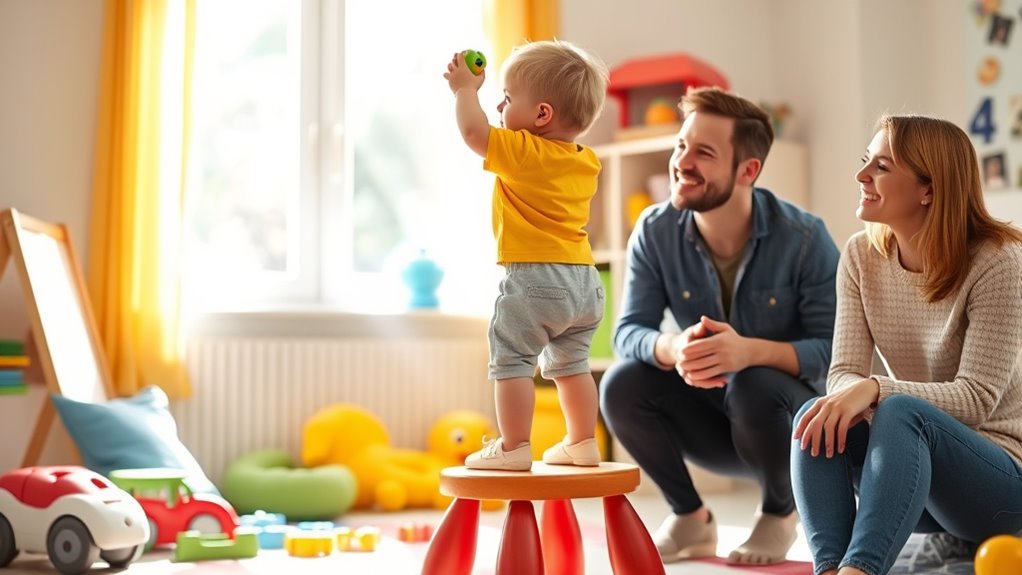
Parenting styles greatly influence a toddler’s journey toward independence. Authoritative parents strike a balance between warmth and control, encouraging decision-making and fostering self-reliance, which helps build self-esteem. Research indicates that open communication about feelings can further bolster a child’s confidence in their independence. Additionally, encouraging independence can lead to improved emotional well-being in children as they learn to navigate their environment. Engaging in self-care practices as a parent can also contribute to a more nurturing atmosphere, positively impacting the child’s growth. Furthermore, understanding the importance of co-parenting strategies can enhance a child’s sense of security as they explore their independence.
Effective parenting styles shape toddlers’ independence, with authoritative approaches fostering self-reliance and self-esteem through balanced warmth and control.
In contrast, authoritarian parents impose strict rules that limit autonomy and discourage independent thought, often leading to anxiety and low self-esteem.
Permissive parents allow for greater freedom, promoting independence but often lacking necessary boundaries, which can confuse children about appropriate behavior.
Finally, uninvolved parents provide minimal guidance or structure, severely hindering the development of independent skills and resulting in poor emotional regulation. Understanding these impacts can help you choose a parenting approach that effectively nurtures your child’s independence and self-confidence. Additionally, establishing healthy boundaries can further support a toddler’s ability to explore and gain confidence in their independence.
Benefits of Encouraging Early Independence

Encouraging early independence in toddlers can lead to numerous benefits that shape their overall development. When you let your child tackle tasks on their own, they’ll gain confidence through their achievements, boosting their self-esteem. This self-reliance enhances their sense of control, motivating them to try new things and persevere through challenges. Additionally, embracing sustainable fashion principles can inspire creativity and encourage children to take pride in their choices. Furthermore, fostering independence aligns with the principles of user consent management, allowing toddlers to learn about making choices that affect their experiences.
Socially, independence helps them form stronger relationships, feel valued in their community, and develop essential cooperation skills. Emotionally, your child builds resilience and problem-solving abilities, nurturing their self-esteem.
Cognitively, independent activities encourage critical thinking and creativity, supporting their academic growth. Additionally, engaging in educational construction toys can provide opportunities for toddlers to explore their independence while developing various skills. Ultimately, fostering independence prepares them for future challenges, teaches life skills, and enhances their mental health, paving the way for self-motivated, successful adulthood.
Overcoming Common Challenges to Independence
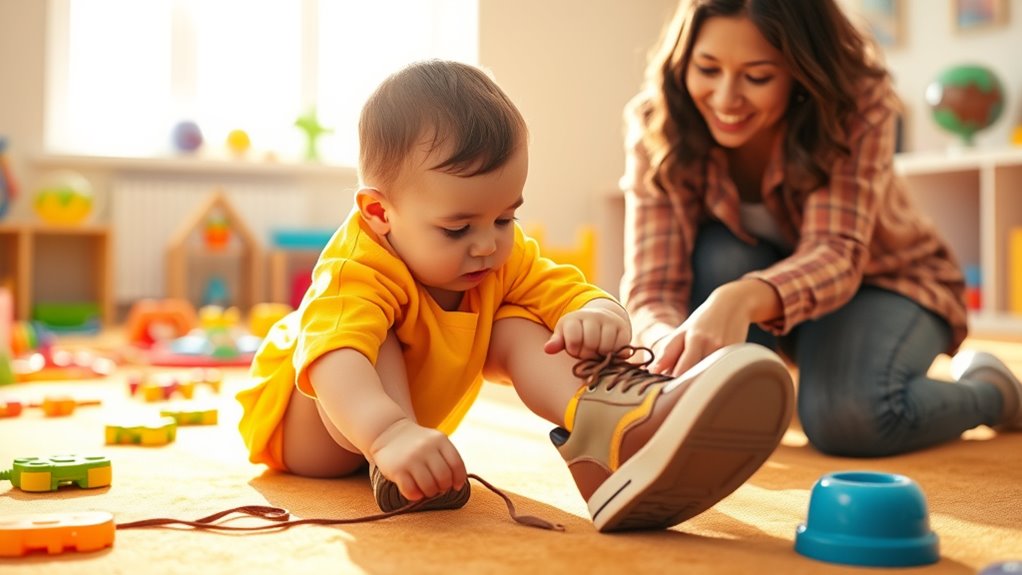
As toddlers commence on their journey toward independence, they often encounter challenges that can lead to resistance and frustration. You might notice them defying authority, which is normal for their development.
To ease power struggles, offer choices that give them a sense of control. Establishing clear routines and expectations helps minimize defiance and creates order.
When they face frustration while trying new tasks, stepping back allows them to learn and grow. Model emotional regulation to help them manage feelings, and provide support without rescuing.
Celebrate their small achievements to boost confidence, and introduce increasingly complex tasks as they succeed.
Creating a Supportive Environment for Exploration
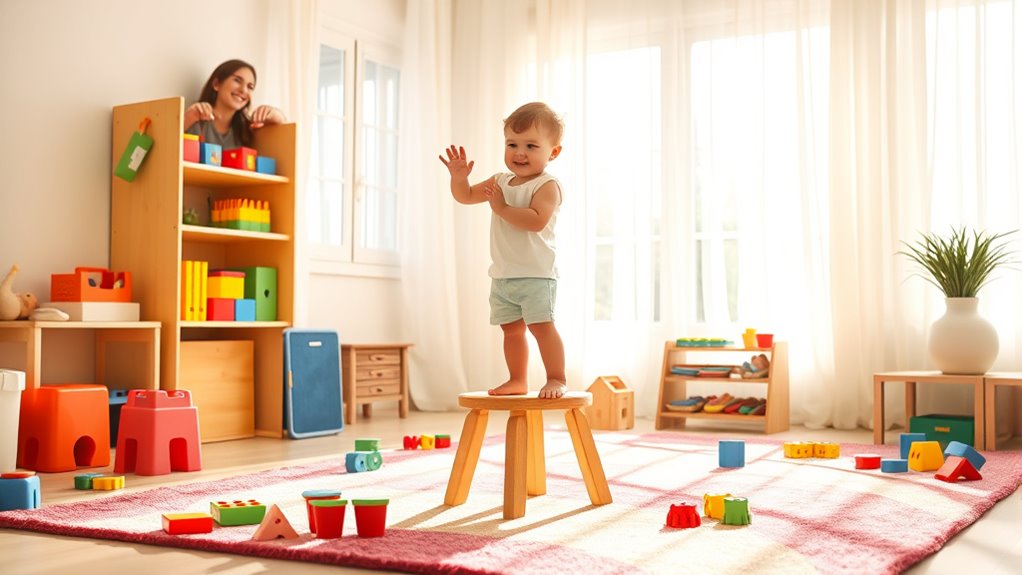
Creating a supportive environment for exploration allows toddlers to thrive as they seek independence. Start by ensuring safety; remove hazards and supervise closely while they explore. Use gates to block off risky areas and provide age-appropriate toys that stimulate their curiosity.
Create stimulating play areas with a variety of materials, accessible shelves, and colorful elements to attract their attention. Don’t forget outdoor spaces—nature offers endless opportunities for discovery. Facilitate hands-on activities and exploration bins filled with different textures, encouraging toddlers to engage their senses.
The Role of Social Interactions in Fostering Autonomy

While toddlers naturally seek independence, social interactions profoundly shape their journey toward autonomy. When you respond positively to your toddler’s initiatives, offering choices, you boost their sense of control and decision-making skills.
Consistent interactions help your child feel secure, fostering the confidence they need to explore independently. Joining group activities enhances their social skills and encourages shared experiences that promote autonomy.
Consistent interactions nurture security and confidence, empowering your child to explore independently and develop essential social skills through shared experiences.
Remember that balancing guidance and independence is essential; explaining rules helps them understand boundaries while supporting their growth. Allowing independent play alongside structured activities nurtures self-reliance.
Finally, celebrate their small achievements and encourage them to express feelings, reinforcing their self-worth and motivation for autonomous actions. Through these interactions, you lay a strong foundation for their development.
Frequently Asked Questions
How Can I Tell if My Toddler Is Ready for Independence?
To tell if your toddler’s ready for independence, observe their behavior in various situations.
Are they engaging in group activities, sharing toys, and following simple rules?
Notice if they initiate conversations or express their feelings.
Check if they can handle basic self-care tasks, like dressing themselves.
Pay attention to their curiosity and problem-solving skills, too.
If they show confidence in new environments, it’s a strong sign they’re ready to explore independence!
What Age Is Ideal to Start Encouraging Independence?
As the saying goes, “You can’t teach an old dog new tricks.”
The ideal age to start encouraging independence is around 18 months. At this stage, toddlers begin to assert themselves with simple tasks, like dressing or self-feeding.
You can support this growth by providing choices and engaging them in daily routines. By fostering their desire to do things on their own, you’ll help them build confidence and essential life skills.
How Do I Handle My Toddler’s Frustration During Independent Tasks?
When handling your toddler’s frustration during independent tasks, start by acknowledging their feelings. Use simple language to name emotions, helping them understand what they’re experiencing.
Offer tasks that are challenging yet achievable to build their persistence. Create a safe environment and minimize overwhelming choices. Encourage repetition in tasks, celebrating small successes to boost their confidence.
Finally, model calmness and patience, demonstrating how to cope with frustration positively and effectively.
Are There Specific Toys That Promote Independence in Toddlers?
Think of toys as bridges that connect your toddler to independence. Specific toys like activity tables, building blocks, and play kitchens can enhance their confidence and skills.
These toys not only promote standing and balance but also inspire imaginative role-play. By choosing open-ended options like Magna-Tiles or tool kits, you encourage creativity and problem-solving.
Rotating toys keeps their interest alive, making each play session a new adventure in self-discovery.
How Can I Balance Independence With Safety Concerns?
To balance independence with safety concerns, you can create safe exploration zones in your home and set clear boundaries.
Teach your child about managing risks, and encourage open communication about safety.
Offer limited choices to empower decision-making and promote self-directed play.
Gradually increase their responsibilities as they grow, while consistently monitoring their progress.
This way, you support their exploration while ensuring they’re safe and aware of their surroundings.
Conclusion
Encouraging independence in toddlers isn’t just about letting them play alone; it’s like giving a bird its first chance to fly. Just as a fledgling learns to soar through trial and error, your child will build confidence as they navigate the world. By fostering an environment that promotes exploration and self-reliance, you’ll watch them spread their wings. Embrace the challenges, celebrate the small victories, and remember: each step they take toward independence is a leap toward their future.
